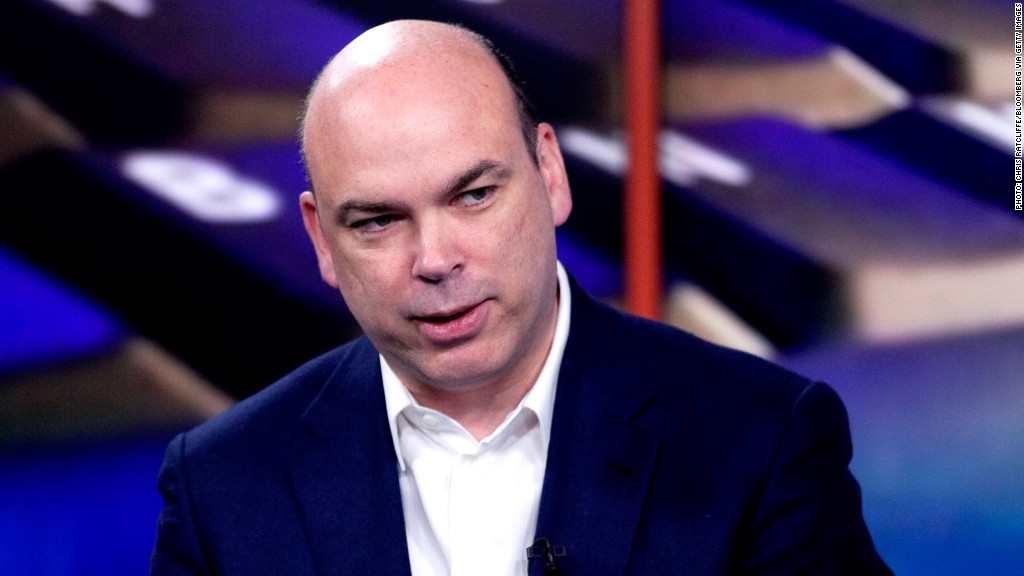
Mike Lynch, founder of embattled Hewlett-Packard subsidiary Autonomy, lashed out at HP on Tuesday after the tech giant accused him of overseeing a company that engaged in accounting fraud.
In an open letter, Lynch said Autonomy's books were clean and kept in accordance with international accounting rules.
"I utterly reject all allegations of impropriety," he said.
Lynch's letter is the latest volley in what's shaping up to be an historically nasty fight, with billions at stake. Lynch, who was fired by HP in May, claims that he still has not heard directly from HP (HPQ), despite the company's public allegations of fraud last week.
HP declined to comment specifically on its dealings with Lynch, but people familiar with the matter told CNNMoney that HP contacted Lynch about the investigation in June. Those people said Lynch was evasive with his answers, so HP opted to go forward with the investigation without Lynch's help.
HP hit back hard at Lynch's defense, saying it believes Autonomy's violations were deliberate.
"We believe we have uncovered extensive evidence of a willful effort on behalf of certain former Autonomy employees to inflate the underlying financial metrics of the company in order to mislead investors and potential buyers," the company said in a written statement on Tuesday. "We look forward to hearing Dr. Lynch and other former Autonomy employees answer questions under penalty of perjury."
The battle between HP and Lynch began last week, when HP claimed that Autonomy -- which it acquired last year for more than $11 billion in cash -- had inflated its accounting with several tricks, including misrepresenting yet-to-be-collected revenue as already-completed sales.
For instance, HP said Autonomy booked the entire value of some long-term sales commitments upfront, before the buyer had paid for all of the products it promised to purchase. Similarly, HP also alleged that Autonomy counted as revenue certain contracts with resellers, even though the resellers only paid Autonomy when they actually sold the products.
Related story: HP's Autonomy write-down is small change
Autonomy was also accused of misrepresenting hardware sales, which carry a low profit margin, as software sales, which carry a much higher margin.
As a result, HP wrote down the value of Autonomy by $8.8 billion last week, $5 billion of which it attributed to fraud. CEO Meg Whitman said that HP believed Autonomy's profit margin to be in the 40% range when it bought the company last year, but its margin is actually closer to 20%.
Lynch, in his open letter, scoffed at the allegations and said that realizing long-term and resellers' revenue upfront was acceptable under the international financial reporting guidelines Autonomy used. He also said that the alleged mischaracterization of hardware sales as software would have "no effect" on sales or profit and only a "minor effect" on margin.
He asked HP's board to provide him with a detailed calculation of how it decided that Autonomy's alleged improprieties add up to $5 billion worth of damage.
"In order to justify a $5 billion accounting write down, a significant amount of revenue must be involved," Lynch wrote. "Please explain how such issues could possibly have gone undetected during the extensive acquisition due diligence process and HP's financial oversight of Autonomy for a year from acquisition until October 2012."
HP, in turn, declined to directly engage Lynch, saying the matter is in law enforcement's hands now.
"While Dr. Lynch is eager for a debate, we believe the legal process is the correct method in which to bring out the facts and take action on behalf of our shareholders," the company said.
Lynch is far from alone in wondering how HP arrived at the $5 billion number. Many financial analysts have also questioned the size of the giant writedown.
However, Lynch's characterization of Autonomy's accounting practices as totally kosher may be a stretch.
An investigation by The Wall Street Journal found that Autonomy engaged in a number of dubious transactions.
For instance, it sold $9 million worth of software to data provider VMS in July 2009, in exchange for an agreement that Autonomy would purchase $13 million in licenses from VMS. Though Autonomy recorded the entire $9 million as revenue, it treated its payment to VMS as a sales and marketing expense. VMS went bankrupt in 2011, still owing Autonomy $6.4 million.

